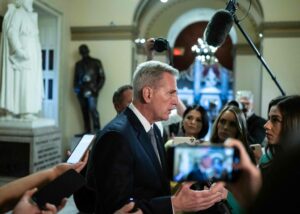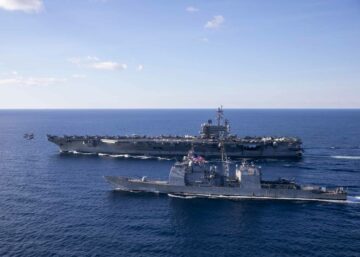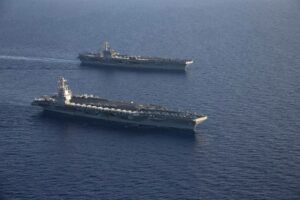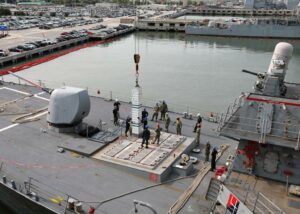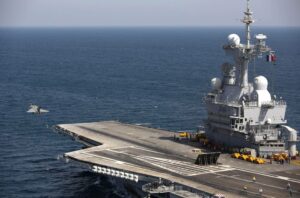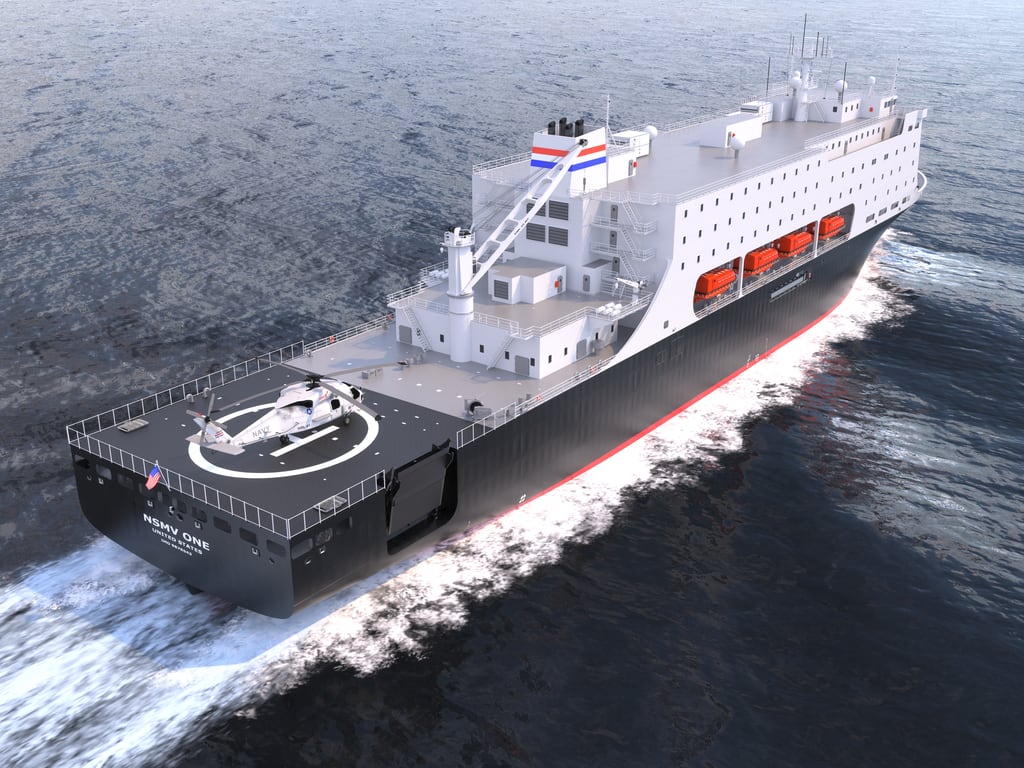
WASHINGTON — A bipartisan group of lawmakers is calling for a national investment in the maritime industry, asking the White House to coordinate between the military and commercial ship sectors and offer a national strategy.
Sen. Mark Kelly, D-Ariz., and Rep. Michael Waltz, R-Fla., headed a Jan. 29 letter signed by 19 lawmakers and sent to the White House, noting China is “expanding its strategic influence over the oceans.”
“It is building a global maritime network, on which the American economy and critical maritime supply chains have become increasingly reliant,” the letter adds. “Meanwhile, the U.S. has failed to give proper attention to the elements of our national sea power.”
The lawmakers note China’s “intimidation” in the South China Sea and the Houthi attacks in the Red Sea are “recent examples of the risks we face in the maritime domain.”
The letter seeks three key changes:
- The establishment of an interagency maritime policy coordinator, who would report to the president and “synchronize national maritime policy and influence industrial base resource decisions across military, civil, and commercial dimensions.”
- A presidential determination that establishes commercial, civil, and military shipbuilding and shipping industries — along with their associated infrastructure and workforces — as “critical infrastructure sectors,” making them eligible for investments under the Defense Production Act Title III authorities.
- The development of a national strategy focused on “de-risking” the U.S. maritime domain from China and other maritime threats.
Kelly in December unveiled plans to support the U.S. maritime industry. The senator said he wanted to see incentives to build more merchant ships that would conduct private business most of the time, but could be called into military service if needed.
Additionally, he called on the Navy to commit to buying more sealift ships to support companies that build big tankers and cargo ships.
Navy Secretary Carlos Del Toro has also pushed for improvements to the commercial shipbuilding and ship repair industries, as a means of bolstering the U.S.’ overall maritime security and naval power.
In November, the secretary convened the first-ever meeting of the Government Shipbuilders Council, where the departments of Defense, Homeland Security, Transportation and Commerce could begin to align their shipbuilding and ship repair plans.
The lawmakers’ plan would elevate the work Del Toro started to the White House level.
Matthew Paxton, president of the Shipbuilders Council of America, told Defense News any future national maritime strategy should include a “holistic view” of how U.S. shipyards and companies can participate in building up a fleet of U.S. naval warships, auxiliary support ships, U.S.-made Jones Act merchant ships that can be called into service and more.
“The national maritime strategy would ideally incorporate feedback from the Government Shipbuilders Council to get a full picture on the needs of all our government customers,” so companies can design dual-use commercial ships that also meet government requirements on fuel efficiency, berthing capacity, tonnage requirements and more, he said.
Megan Eckstein is the naval warfare reporter at Defense News. She has covered military news since 2009, with a focus on U.S. Navy and Marine Corps operations, acquisition programs and budgets. She has reported from four geographic fleets and is happiest when she’s filing stories from a ship. Megan is a University of Maryland alumna.
- SEO Powered Content & PR Distribution. Get Amplified Today.
- PlatoData.Network Vertical Generative Ai. Empower Yourself. Access Here.
- PlatoAiStream. Web3 Intelligence. Knowledge Amplified. Access Here.
- PlatoESG. Carbon, CleanTech, Energy, Environment, Solar, Waste Management. Access Here.
- PlatoHealth. Biotech and Clinical Trials Intelligence. Access Here.
- Source: https://www.defensenews.com/naval/2024/01/30/lawmakers-seek-national-coordination-support-for-maritime-industry/
- :has
- :is
- :where
- $UP
- 11
- 19
- 29
- 70
- a
- acquisition
- across
- Act
- Adds
- align
- All
- along
- also
- america
- American
- American economy
- an
- and
- any
- ARE
- AS
- asking
- associated
- At
- Attacks
- attention
- Authorities
- base
- BE
- become
- begin
- between
- Big
- bipartisan
- bolstering
- Budgets
- build
- Building
- business
- but
- Buying
- by
- called
- calling
- CAN
- Capacity
- Cargo
- carlos
- chains
- Changes
- China
- Chinas
- civil
- Commerce
- commercial
- commit
- Companies
- Conduct
- coordinate
- coordination
- Coordinator
- corps
- could
- Council
- covered
- critical
- Customers
- December
- decisions
- Defense
- del
- departments
- Design
- determination
- Development
- dimensions
- domain
- economy
- efficiency
- elements
- ELEVATE
- eligible
- establishes
- establishment
- examples
- Face
- Failed
- feedback
- Filing
- first-ever
- FLEET
- Focus
- focused
- For
- four
- from
- Fuel
- fuel efficiency
- full
- future
- geographic
- get
- Give
- Global
- Government
- Group
- Have
- he
- headed
- homeland
- Homeland Security
- House
- How
- HTTPS
- ideally
- if
- iii
- images
- improvements
- in
- Incentives
- include
- incorporate
- increasingly
- industrial
- industries
- industry
- influence
- Infrastructure
- into
- investment
- Investments
- ITS
- Jan
- jones
- Key
- lawmakers
- letter
- Level
- Making
- Marine
- Maritime
- mark
- Maryland
- means
- Meet
- Megan
- Merchant
- Michael
- Military
- more
- most
- National
- needed
- needs
- network
- news
- note
- noting
- November
- oceans
- of
- offer
- on
- Operations
- Other
- our
- over
- overall
- participate
- picture
- plan
- plans
- plato
- Plato Data Intelligence
- PlatoData
- policy
- power
- president
- presidential
- private
- Production
- Programs
- proper
- Red
- repair
- report
- Reported
- reporter
- Requirements
- resource
- risks
- s
- Said
- SEA
- secretary
- Sectors
- security
- see
- Seek
- Seeks
- Senator
- sent
- service
- she
- ship
- Shipping
- ships
- should
- signed
- since
- So
- South
- started
- Stories
- Strategic
- Strategy
- supply
- Supply chains
- support
- that
- The
- their
- Them
- threats
- three
- time
- Title
- to
- told
- transportation
- u.s.
- U.S. Navy
- under
- university
- University of Maryland
- wanted
- we
- when
- which
- white
- White House
- WHO
- with
- Work
- would
- zephyrnet

